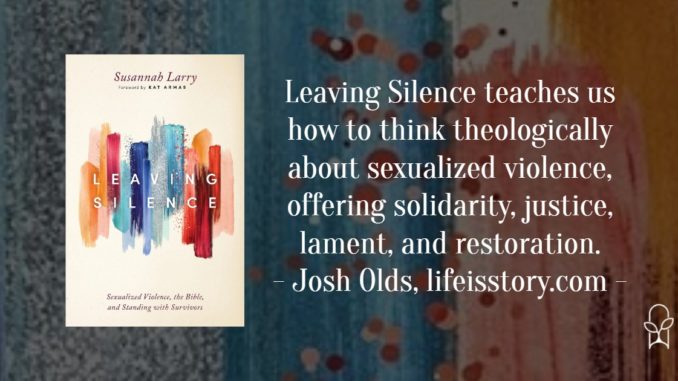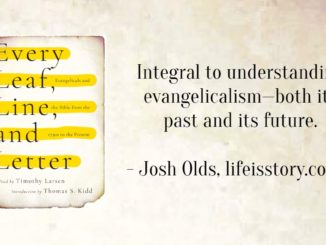
Published by Herald Press on August 3, 2021
Genres: Non-Fiction, Christian Life, Theology
Buy on Amazon
Goodreads

#MeToo. #ChurchToo. #GodToo?
What if survivors of sexualized violence experience the Bible as a powerful spiritual resource rather than an oppressive tool in the hands of those seeking to dismiss or justify abuse? Bible scholar Susannah Larry leads fellow survivors and those who care for them in a journey toward reclaiming the Bible amid the trauma of sexualized violence.
Leaving Silence: Sexualized Violence, the Bible, and Standing with Survivors is an unflinching examination of sexualized violence in the Bible and the God who stands steadfastly with survivors. Larry addresses biblical experiences of coercion, familial betrayal, and self-blame while also illuminating God’s constant care and concern.
By centering the experiences of survivors in Scripture, Larry opens new insights into some of the Bible’s most difficult texts and releases its ancient stories to serve as a powerful healing witness to the God who has shared in the experience of sexualized violence. Under Larry’s skillful guidance, readers will rediscover the God who is present in experiences of trauma and who desires ultimate wholeness for survivors.
A book like Leaving Silence is difficult to read because it forces readers to face the harm of sexualized violence—and not just as something perpetrated by “the world” but as a recurring theme in the modern church and the ancient Scriptures. It’s a needed difficulty because the only way of reckoning with our current crisis—consider the current continued cover-up by the Southern Baptist Convention or the far-ranging #MeToo and #ChurchToo movements—is to face it head-on. The way author Susannah Larry chooses to confront it is to contextualize it within Scripture. This sin is not new. Sexualized violence is embedded into our history and our religion. That’s not an excuse to condone it, but rather an opportunity to use the lessons learned in Scripture to apply to a modern solution.
The first account of sexualized violence that Leaving Silence discusses is that of Abraham and Hagar. A normative evangelical reading of Genesis 16 just sort of glosses over that Abraham takes Sarah’s servant as his concubine. Maybe you get a condemnation of polygamy while also conceding that cultural context allowed for it. What you rarely get is an understanding that Hagar had no say in the matter. Surrogacy is forced on her as she loses bodily autonomy as a slave to her masters. Larry also considers how Sarah functions as both victim and enabler and admits that the whole situation and God’s response to it is not something she’s satisfied with. It’s a powerful opening that reframes the “biblical heroes” and asks us to sit in the tension and uncomfortableness of it all. Facing sexualized violence in the church means willingness to face it in Scripture as well. And it’s in wrestling with this Scripture that we find that Hagar—victim of sexualized violence from Israel’s first patriarch—not only speaks to but names Yahweh:
When God sees Hagar, he doesn’t see a cog in the will of his own wants and needs, as did Sarah. He doesn’t see a body that he could use as he wills, as did Abraham. He doesn’t see a slave woman who is abusable and disposable. When God looks at Hagar he…sees a powerful mother of a nation.
I spend so much time on this first encounter because it sets the tone for the scope of the book. While Leaving Silence references modern scandals and contemporary applications, Larry—a Hebrew scholar—spends the majority of her time mining the Old Testament texts, using them to shed light on modern injustices. This is important because she’s not just appropriating Scripture for use in modern issues, but uses it in a real and substantive way. Leaving Silence teaches us how to think theologically about sexualized violence, offering solidarity, justice, lament, and restoration. It doesn’t offer simple answers or facetious fixes. It’s deep treatment of the root of the problem, not just its rotten fruit.



